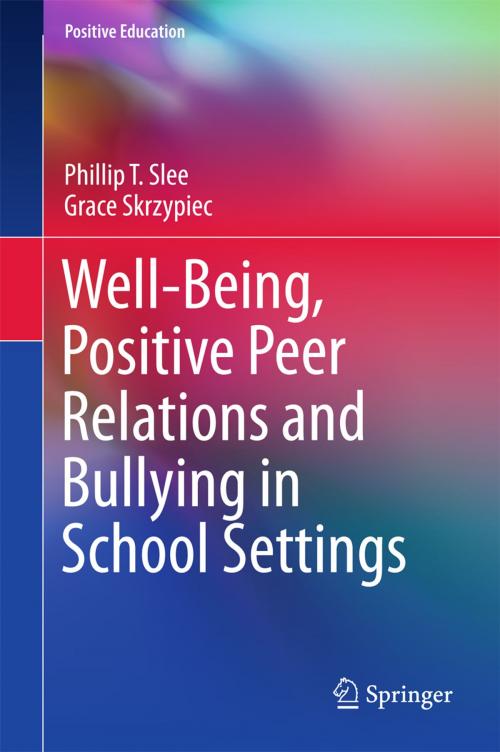Well-Being, Positive Peer Relations and Bullying in School Settings
Nonfiction, Reference & Language, Education & Teaching, Educational Theory, Educational Psychology, Social & Cultural Studies, Social Science, Sociology, Health & Well Being, Psychology| Author: | Phillip T. Slee, Grace Skrzypiec | ISBN: | 9783319430393 |
| Publisher: | Springer International Publishing | Publication: | September 15, 2016 |
| Imprint: | Springer | Language: | English |
| Author: | Phillip T. Slee, Grace Skrzypiec |
| ISBN: | 9783319430393 |
| Publisher: | Springer International Publishing |
| Publication: | September 15, 2016 |
| Imprint: | Springer |
| Language: | English |
This book focuses on well-being at school in association with positive peer relationships and bullying. Taking an integrative and community-based approach, the book outlines the significance of student-school relationships for well-being and emphasizes the importance of school and classroom climate for promoting well-being. Embedded in research and theory, the book reflects the belief that all of our dealings with children and young people in whatever role, whether as parent or teacher or in some other capacity, are bounded by theory, either implicit or explicit. The book highlights the role of partnerships and linkages in addressing school-based well-being and anti-bullying programs. It pays special attention to the barriers and facilitators that schools must address in engaging with external agencies to deliver strong evidence-based initiatives. The international concern with school bullying is given particular consideration in relation to its impact on the well-being of all involved. A feature of the text is the focus given to the implementation of programs into the busy and complex world of schools and classrooms recognizing that the effectiveness and impact of any school-based program is strongly related to the quality of its implementation. The text reflects a commitment of the authors to a broad-based systemic view of development, taking into account family, school, community and culture as influential factors. The text incorporates a number of pedagogical features e.g. classroom based activities and discussion starters, reflections on points raised in the text, and case studies. This book is of special interest to teachers, school counselors, educational psychologists and mental health professionals working in school settings.
This book focuses on well-being at school in association with positive peer relationships and bullying. Taking an integrative and community-based approach, the book outlines the significance of student-school relationships for well-being and emphasizes the importance of school and classroom climate for promoting well-being. Embedded in research and theory, the book reflects the belief that all of our dealings with children and young people in whatever role, whether as parent or teacher or in some other capacity, are bounded by theory, either implicit or explicit. The book highlights the role of partnerships and linkages in addressing school-based well-being and anti-bullying programs. It pays special attention to the barriers and facilitators that schools must address in engaging with external agencies to deliver strong evidence-based initiatives. The international concern with school bullying is given particular consideration in relation to its impact on the well-being of all involved. A feature of the text is the focus given to the implementation of programs into the busy and complex world of schools and classrooms recognizing that the effectiveness and impact of any school-based program is strongly related to the quality of its implementation. The text reflects a commitment of the authors to a broad-based systemic view of development, taking into account family, school, community and culture as influential factors. The text incorporates a number of pedagogical features e.g. classroom based activities and discussion starters, reflections on points raised in the text, and case studies. This book is of special interest to teachers, school counselors, educational psychologists and mental health professionals working in school settings.















